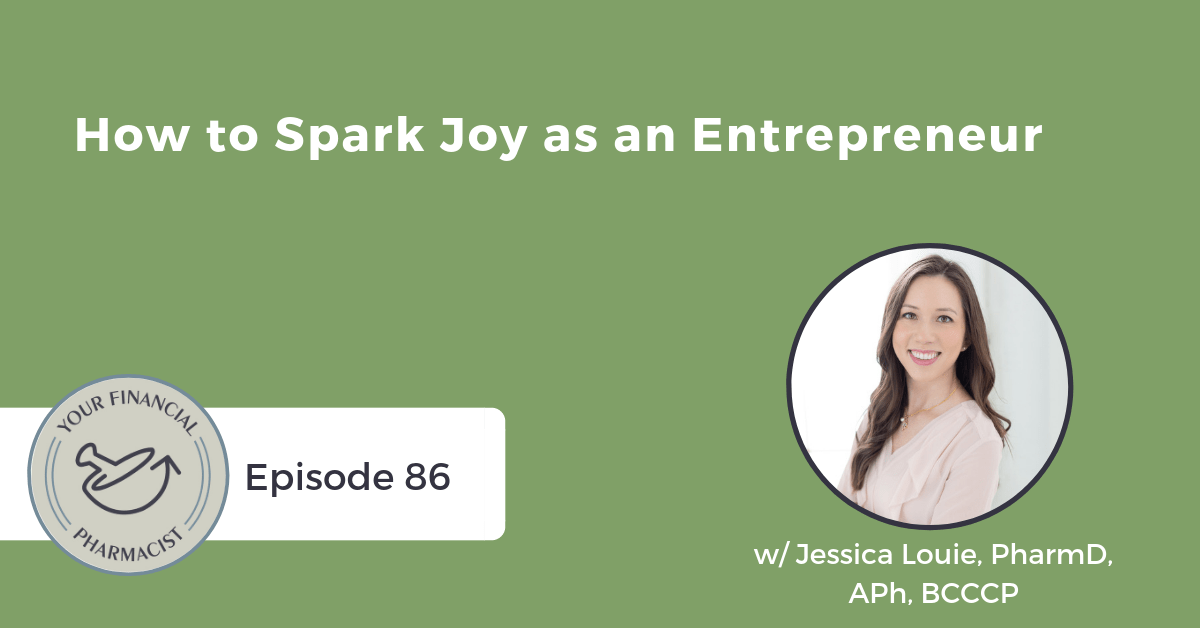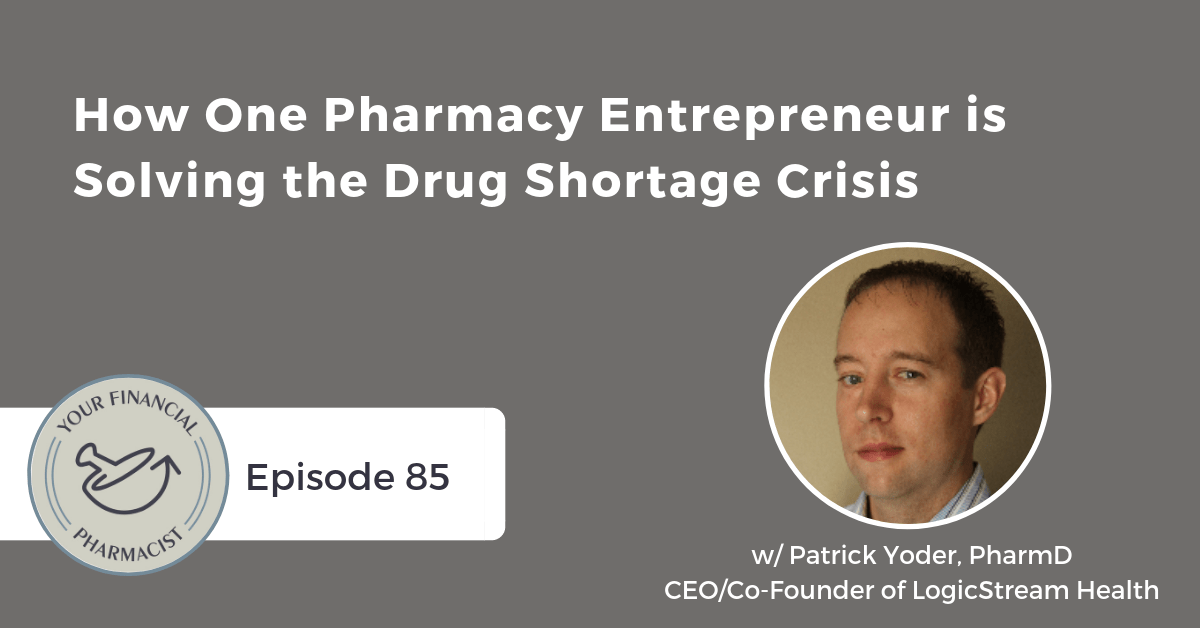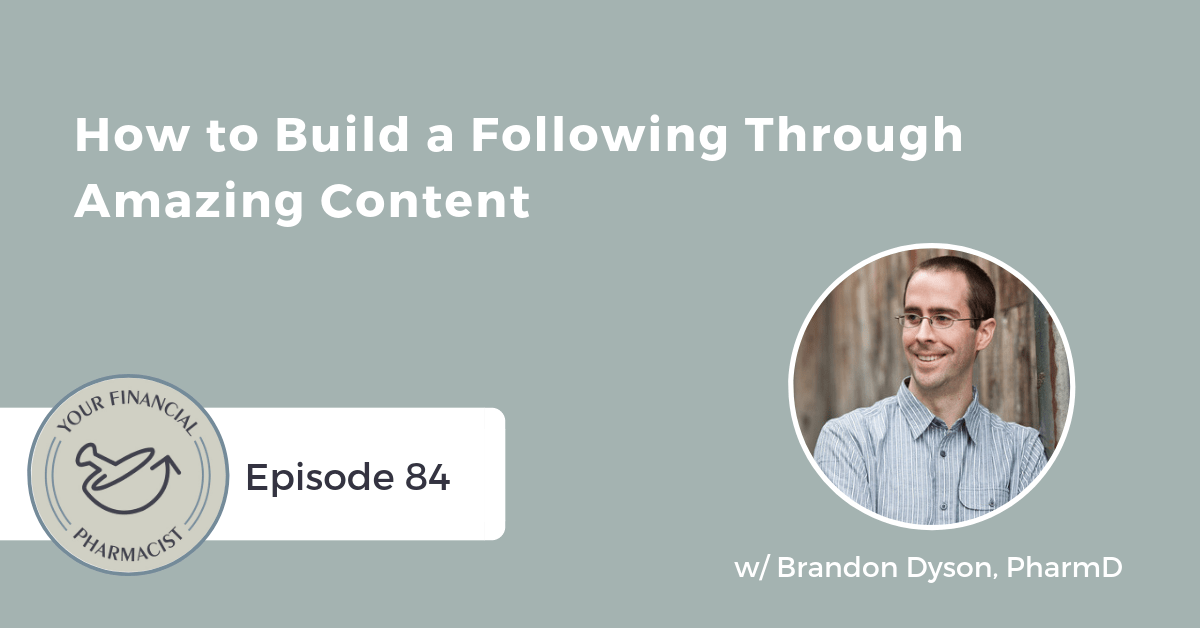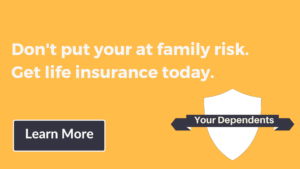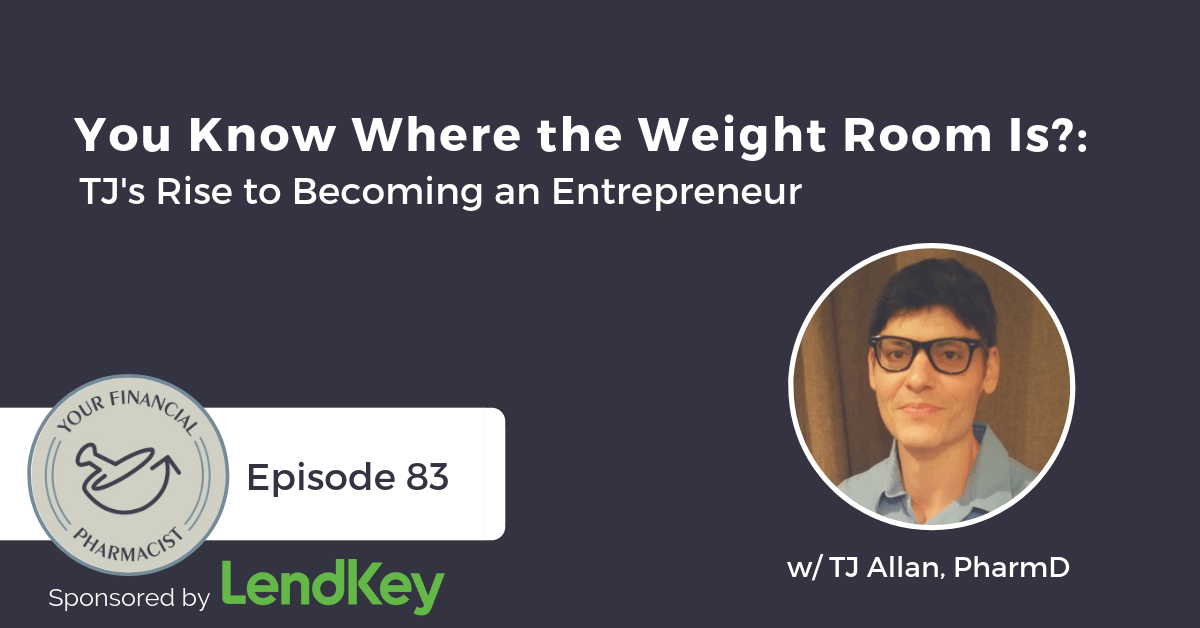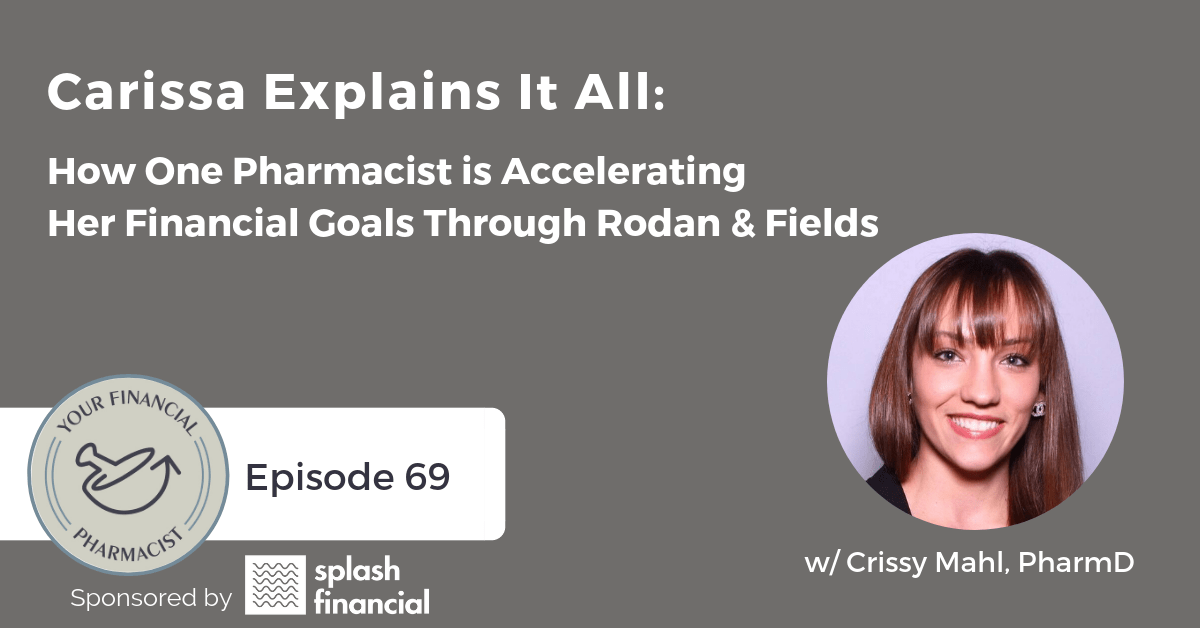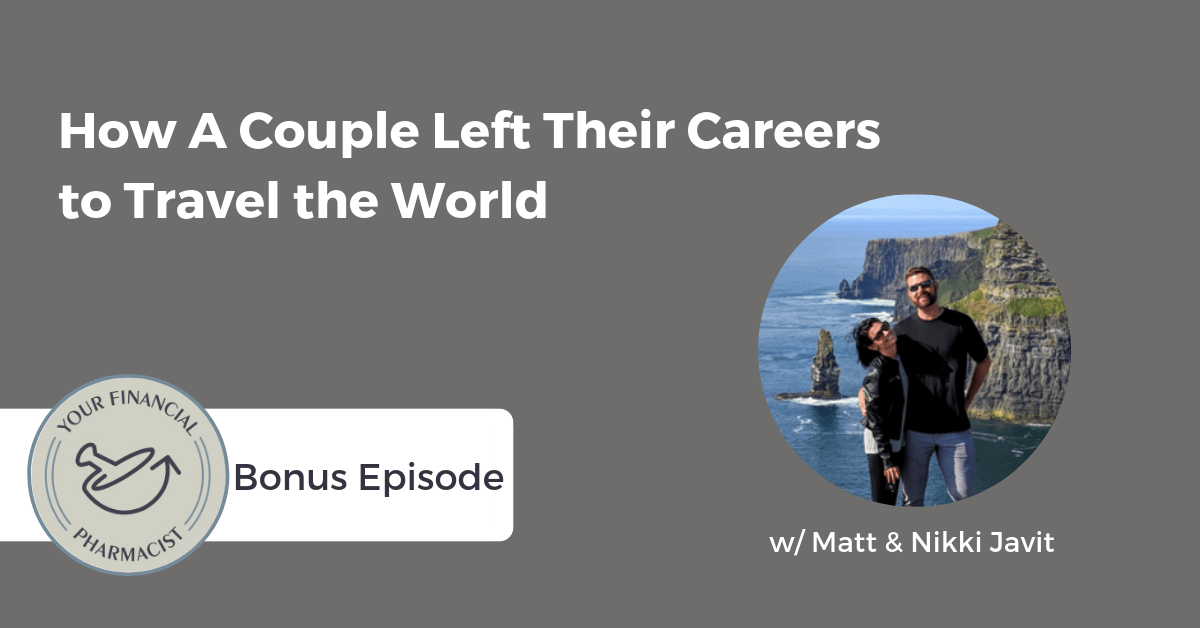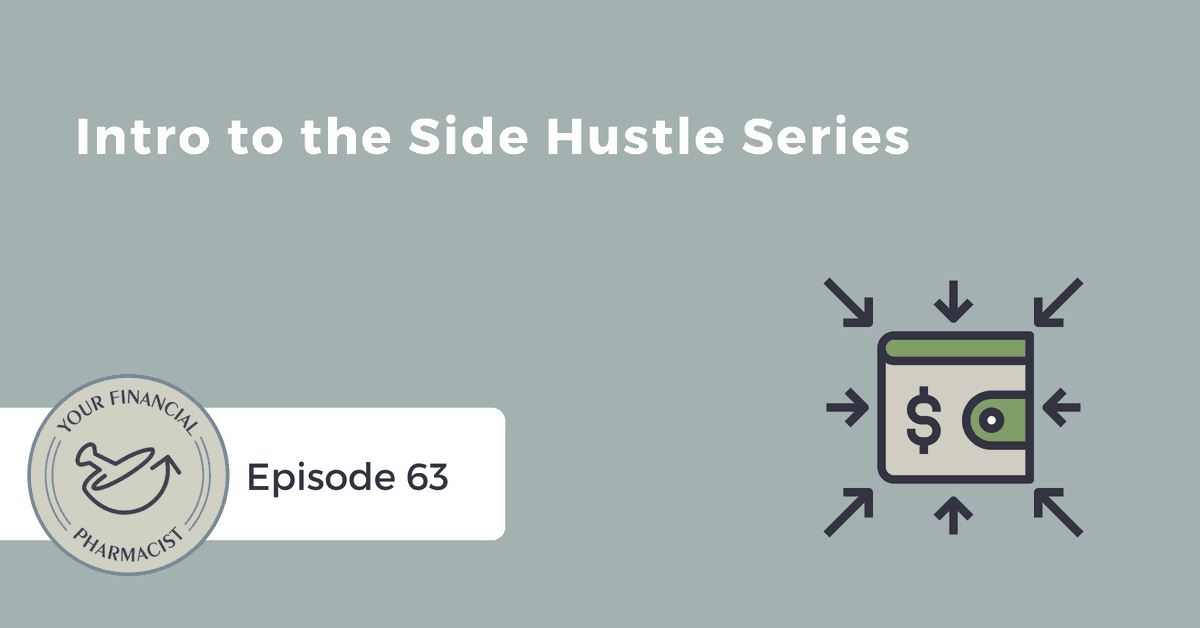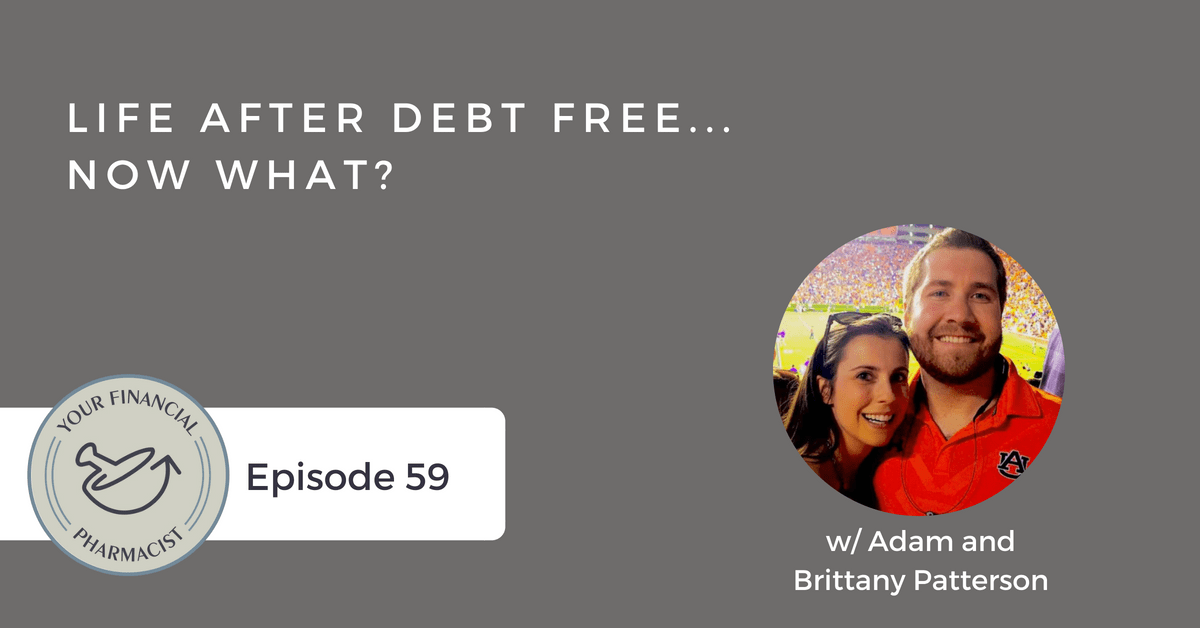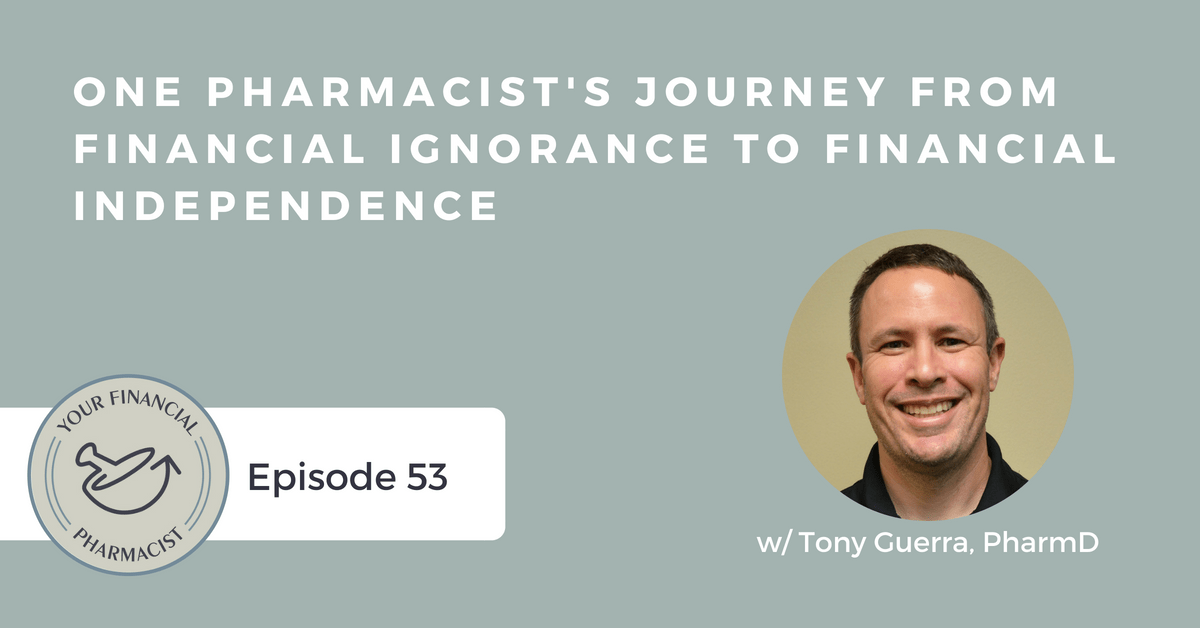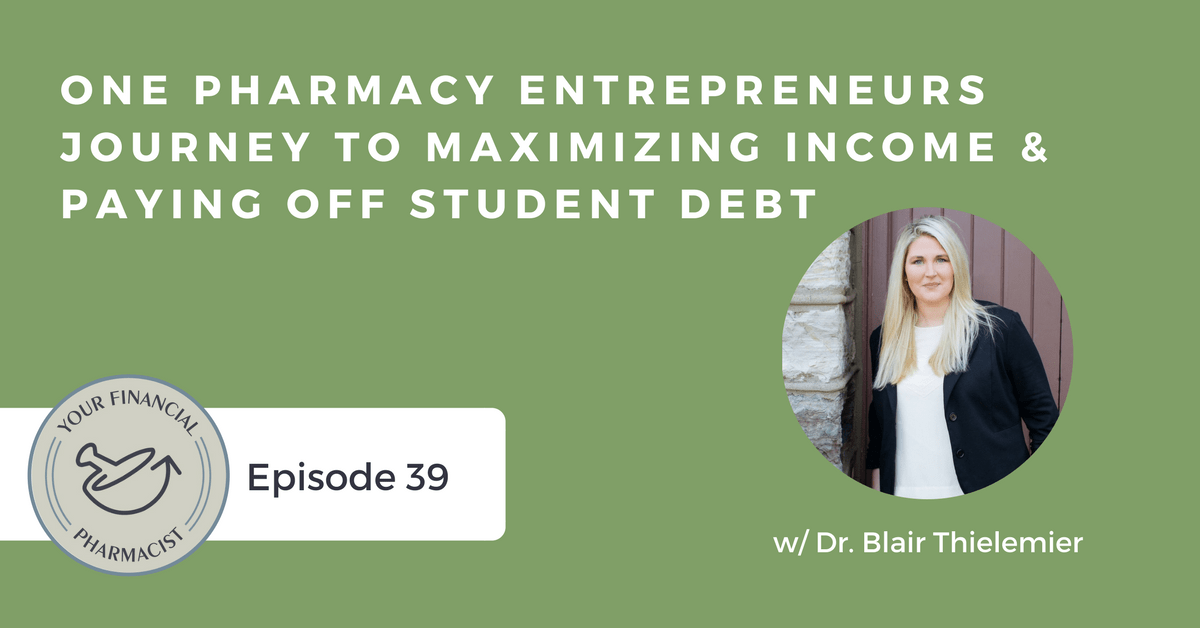How to Spark Joy as an Entrepreneur
On this episode of the Your Financial Pharmacist podcast, Tim Church, YFP team member, interviews Dr. Jessica Louie about how to spark joy as an entrepreneur. Jessica is a Board-Certified Critical Care Pharmacist and Assistant Professor of Pharmacy Practice. She is also a multi-passionate entrepreneur with 3 small businesses. Jessica is the CEO of Clarify Simplify Align, High Performance Life Coach, Professional Organizer and Certified KonMari Consultant.
About Today’s Guest
Dr. Jessica Louie is CEO of Clarify Simplify Align, High Performance Life Coach, Professional Organizer and Certified KonMari Consultant who helps busy professionals gain clarity of their purpose, simplify and declutter their home and minds, and align their work into their lives with simple processes to avoid overwhelm, lead with confidence and curate lives they LOVE.
Jessica holds a Doctor of Pharmacy degree from University of Southern California (USC), Advanced Practice Pharmacist license (APh) and is board-certified in critical care (BCCCP). She uses her healthcare background to coach clients through emotional and difficult decisions. Jessica resides in Pasadena/Los Angeles, California and serves her clients in-person locally, travels to Salt Lake City, Utah and Brookfield, Wisconsin and provides virtual coaching sessions.
Summary
On this episode, Tim interviews Dr. Jessica Louie about her entrepreneurial journey in the creation of three businesses that have really taken off. In the beginning of the episode, Jessica shares more about her background and the inspiration she had to start side businesses on top of her busy full-time pharmacy career. Jessica is an Assistant Professor of Pharmacy Practice at West Coast University School of Pharmacy and is a critical care pharmacist working in an intensive care unit at a hospital. She divides her time between both settings and truly loves the patient interaction she has. At the end of her residency, Jessica was burned out. After some life changing events, she realized that she wanted to live with more intention and focus on spending time with people she loved. She was also ready to take on new challenges. This began a transformative journey in finding her why and beginning several businesses.
Petit Style Script, Jessica’s first business, is a fashion and lifestyle blog that helps women make intentional clothing choices by investing in quality pieces and by creating a capsule wardrobe. She dove deep into website design, social media management and marketing which helped to keep her costs lower. Her revenue is earned by affiliate commissions and through sponsored content instead of through a signature product.
In her newest business, Clarify Simplify Align, Jessica helps other busy professionals gain clarity of their purpose, simplify and declutter their home and minds, and align work into their lives. She takes clients through a transformative process that includes a free consultation, a simplifying process in decluttering your home in an intentional way, and using your new mindset and habits to apply to other areas of your. Jessica is a certified KonMari consultant which is the popular method founded by Marie Kondo, however, she believes that this whole process is more than the KonMari method. She provides emotional and physical support while also offering accountability to her clients. She shares that there are many benefits to decluttering and organizing your environment like gaining free time, reducing anxiety, taking control of your health and finances and gaining confidence in decision making. She works with clients locally in Southern California but is also able to host virtual online sessions.
Clarify Simplify Align was created in July 2018. Jessica currently earns 5 figures and has a goal of moving into the 6 figure range in the next 12 months. Her side hustle income is being allocated toward savings, investments, and travel. Jessica has been able to balance the work with her businesses and her full-time pharmacy career. She spends about 25 to 35 hours a week on her businesses, depending on the number of clients she has. Her biggest advice to pharmacists that are wanting to step into an entrepreneurial journey is to gain clarity and follow your passion.
Mentioned on the Show
- YFP Giveaway: Tax Preparation and Filing Services
- Petite Style Script
- Like to Know It Rewards Style
- Simon Sinek
- Clarify Simplify Align
- KonMari Method
- The Life-Changing Magic of Tidying Up: The Japanese Art of Decluttering and Organizing by Marie Kondo
- Spark Joy: An Illustrated Master Class on the Art of Organizing and Tidying Up by Marie Kondo
- Start with Why: How Great Leaders Inspire Everyone to Take Action by Simon Sinek
- High Performance Habits: How Extraordinary People Become that Way by Brendan Burchard
- Soulful Simplicity: How Living with Less Can Lead to So Much More by Courtney Carver
- Grit: The Power of Passion and Perseverance by Angela Duckworth
- Contact Dr. Jessica Louie
Episode Transcript
Tim Church: What’s up, everybody? And welcome to Episode 086. Wow, that is just crazy to say that number as we move closer to 100 episodes. Now, I can hardly take any of that credit, given the other Tims have done most of the shows. So kudos to them. And also I want to have a big shout out to Caitlyn on our team, who does our editing and does an excellent job. If you basically consumed any news or social media in the past couple months, then you know about the show Tidying Up with Marie Kondo. And the show is just everywhere, and it’s an incredibly popular series on Netflix right now. But just in case you’re in the dark, this show is all about world-renowned tidying expert, Marie Kondo, helping clients clear out their clutter in their home and choose joy. So what the heck does that have to do with today’s episode? Well, our guest today is not only an accomplished pharmacist, but she’s one of the few that holds the KonMari consultant certification, which basically allows her to perform in-home and virtual consults, similar to what you see Marie Kondo do on the show. So I’m really excited for her to talk more about this and her other business ventures. So let’s go ahead and jump into the interview. Jessica, thank you so much for taking the time to come on the show and for being part of this side hustle edition.
Jessica Louie: Thank you for having me, Tim.
Tim Church: When I sent out the first email alerting the community that we would be talking more about side hustles on the podcast, you were the first one to respond, and I could tell that this was something you were excited about and wanted to share what you’ve been doing outside of your full-time job. So before we kind of jump into your businesses and your pharmacist’s career, I want to know what gets you so fired up about this topic of side hustles and entrepreneurship.
Jessica Louie: Well, thank you. It was really a life transformation in terms of starting my small businesses 2.5 years ago. And it’s definitely been a great learning experience for myself that I really would love to share with other pharmacists and healthcare professionals and students.
Tim Church: That’s great. And kind of going back into before you started any of these businesses, where did that inspiration come from where you just decided, hey, I’m going to do something outside of my typical pharmacist job or my duties there?
Jessica Louie: Well, as I was finishing my residency back in 2015 and transitioning into my role as an assistant professor in pharmacy practice, I was really undergoing a burnout type of episode in healthcare at that moment. And like other busy professionals, I was kind of spinning around this quarter-life crisis, accumulating things in terms of I had been on a long journey of nine years of training for my bachelor degree, doctorate, residency, PGY1, PGY2, board certification, and you know, I wasn’t really enjoying the journey. I was just trying to get to the finish line. And then I realized, you know, how life can be really short when my aunt died suddenly at age 51. So now I really like to live with intention and be present by the people I’m surrounded with and the things I’m surrounded with that spark joy. So I really want to share my story to see if it will help inspire someone else to really transform their own life and really be happy with their day-to-day life.
Tim Church: Wow, thank you for sharing that, Jessica. I love what you said there about being intentional and kind of getting the fire started to pursue some of those passions and ideas that you had. And I believe that’s so true. And I think that that’s one of the most common characteristics of people that have an entrepreneurial spirit is just being intentional about what they’re trying to do. And a lot of times, we live a life that’s reactive instead of proactive. So that’s really great. So can you talk a little bit about your current role as a pharmacist? You mentioned that you had a long journey and did residency training in order to get there. But talk a little bit about the role that you’re in now and what you’re doing.
Jessica Louie: Yes. So right now, I am an assistant professor of pharmacy practice at West Coast University School of Pharmacy in Los Angeles. And I am a critical care pharmacist, so I work in the intensive care unit of a local hospital. And you know, my current role is really divided between the university and my practice site. So this is my fourth year teaching at the School of Pharmacy, and I am really passionate about teaching critical care topics related to respiratory and cardiology. And most recently, I am developing elective courses to focus on well being, resiliency and burnout prevention in our graduate students. So that’s a passion of mine in the pharmacy world.
Tim Church: So how do you split that up between your teaching responsibilities and your role in the critical care unit?
Jessica Louie: Currently, I spend a little bit more time at the university. About 60-70% of my time is at the university during the semesters. We have 12-week semesters, and we have long winter and summer breaks. And then I’m at the hospital setting two days a week, usually. And it’s a great balance in terms of being there to educate the students and also being there to stay up-to-date on the healthcare institution.
Tim Church: Great. And can you go into a little bit more detail about what is your day like typically at the hospital?
Jessica Louie: Typically, at the hospital, it’s a local community hospital. And it’s a Level 2 Trauma Center, so we’ll usually start where you’re going in and working out patients, getting ready for interprofessional rounding in the intensive care unit or with the other medical teams. They do have medical students and medical residents at the institution. And then going on rounds and completing some of the in-person work with the patients with their medication reconciliation, their pain management and preventative health screenings and putting some progress notes, both for the other healthcare professionals and for pass-off to the other pharmacist. And during that process, if there’s students on rotations, walking them through that process in the morning and then also meeting with them in the afternoon for educational discussions on different topics and different patients. And then also assisting other pharmacists in the setting to see what they need help with.
Tim Church: So it sounds like you’re in a very clinical role that’s very much participating in direct patient care and working with other healthcare professionals. Would that be true?
Jessica Louie: Yes, and really trying to see where we can expand service lines because in California, there’s, you know, a need for some expansion of service lines in the hospital setting. So working on that right now. We just had a new law passed in California requiring pharmacists to perform the medication reconciliation in the hospital setting. And I know some hospitals are struggling with that new implementation of that law. So seeing it work and help with resources and things like that.
Tim Church: And what would you say are your favorite aspects about your job? You know, I think there’s a lot of negativity in our profession, and I think it depends on the setting that you’re in and the responsibilities that you’re doing, but what do you most enjoy about what you’re doing as a pharmacist?
Jessica Louie: I definitely enjoy the patient interaction and helping them through the process. I know critical care in the intensive care unit can be an emotional and difficult situation for these patients and their families. And that’s one of the reasons why I am part of a new initiative with the Society of Critical Care Medicine to target post-ICU syndrome. So similar to PTSD, our ICU patients and how they transition and how their quality of life changes, so that brings me a lot of joy in terms of trying to give back to these critically ill patients and their families and making sure that they do have the support system, even when they’re outside of the ICU setting and in transitions of care.
Tim Church: Wow. I think that sounds like a really great program. And I, working in ambulatory care, I didn’t know that that was even a thing or something that patients were dealing with. So I think that’s really a great initiative to kind of get that going and identifying that patient need and looking for ways to integrate into that program. So I think that’s really cool.
Jessica Louie: Thank you.
Tim Church: So you talked about that you’re on this long journey, it’s taking you nine years with all of your residency training. Do you feel like it was worth it?
Jessica Louie: I definitely feel that it was worth it. I think that’s it’s important to take a step back, though, and remember that it’s not about getting to the destination. It’s about enjoying the journey and the experiences. And I think that there were times during that nine-year process where that was definitely forgotten. And if you’re familiar with the growth and fixed mindset type of philosophies, it was definitely in this fixed mindset instead of a growth mindset in terms of, you know, doing this for myself and for my patients. And you know, just getting back to why did I really go through this process? And what impact do I want to have on patients and the healthcare community and other people? So it definitely was worth it, and I wouldn’t change it looking back.
Tim Church: That’s so good. And I think you made some really strong points there. And I think that a lot of pharmacists who are on a long journey to get to their career and where they’re trying to is sometimes you can forget a lot of those things that are important along the way. So you talked about at some point, you got inspired and you wanted to start pursuing some things beyond pharmacy and really focus on some other passions. So what were some of your main motivations besides, you know, feeling like life is so short and that you really have to be intentional about going after things that you want to do. What were some of your other main motivators?
Jessica Louie: At that point in my life, you know, I really had achieved the things that I had set out to achieve. And it was time to take on new challenges. I like new challenges and lifelong learning, so I had, you know, a strong passion for helping other women feel confident in how they dressed and their wardrobe choices. And you know, I started that as basically my first hobby that I turned into my first small business called Petite Style Script. And you know, because I like to challenge myself, I wanted to learn how to website design, how to run social media and marketing, so I ran all of that as a solopreneur over the last 2.5 years. And I gained a lot of skill sets that I was able to apply to my other two businesses.
Tim Church: That is so cool. So you really bootstrapped a lot of this getting in off the ground in terms of I’m going to learn how to do all of the back-end work, I’m going to learn website design. I’m going to do it all. I think that’s really cool. And sometimes, I think especially if you don’t know where to start or maybe you’re limited with funds and don’t want to hire people, that that’s a great way to get going. So talk a little bit more about Petite Style Script and kind of what that business is all about. And what are some of the services and offerings that are through that business?
Jessica Louie: So I focused on Petite Style Script at first. You know, my aunt had passed away earlier that year and she was really a big fan of shoes and handbags and women’s fashion. So I wanted to help other women, especially petite-sized women feel confident and empowered by their outfit and wardrobe choices. So it is a fashion and lifestyle blog, and although it has a lot of petite information, it also caters to other women. And I’ve turned it into really being intentional with your outfit choices by creating capsule wardrobes. So that’s one of my signature products and services. And then just highlighting really classic style where you’re investing in quality over quantity of pieces. So I talk about things that I own and things that I recommend and sizing and fit and then how to style things together to really have a classic wardrobe that will last for years to come. So there’s a lot of just how-to’s and resources on the website that are free for people to read or join the email list to get weekly style advice.
Tim Church: And so what you’re selling is actually the advice of style but not actual wardrobe or physical products, is that right?
Jessica Louie: That’s correct. So I don’t physically make any of the products. I will earn income through affiliate commissions or sponsored content with companies that I really love. So I have a few companies that I’ve used, even from when I was young that I’ve been able to partner with and really showcase why those companies are great for the environment and really quality products to offer to my readers.
Tim Church: Can you go into a little bit more detail about affiliate marketing with this business and how you’re earning income? Because I think a lot of times, you know, the word “affiliate marketing” sometimes can have a negative connotation. But I actually think it can be a great way to point people to the right products and services and actually can provide a lot of value.
Jessica Louie: Yes. So affiliate marketing or affiliate commission is really popular in the fashion blogging world. I learned that early on, both from your website and from your social media. So basically, I am creating content and articles online. And I am talking about different products, I’m recommending how to style them together, talking about my sizing that I have purchased. And then I’ll link to my outfit or to other items that are similar to my outfit if those items are no longer in season or available online. And then if readers would like to purchase the same item that I’m wearing or a similar item that I’m wearing, they’re able to click on the link and I earn a small affiliate commission when they purchase the item through the website. So I work pretty closely with the Like to Know It and RewardStyle affiliate company and a few other companies to really showcase this is what I personally own and recommend and I’ve tried it out. And I’m not necessarily getting paid to try it out, that would be sponsored content, which is different than affiliate income. I have personally purchased the clothing I’m wearing, and then I’m going to link to it to earn a small commission from you reading the how to articles.
Tim Church: So I think that’s a great point that you put on there in that you’re not just promoting and pumping products and different attire that anybody could use or just something that you find that could earn income. These are actually things that you’re recommending to people either because you’ve tried it out or feel very confident about the product that they’re offering.
Jessica Louie: Yes. And I mean, personally, in my opinion, when I go and buy a product, you know, I like to read a review or see how it fits on someone, especially when it’s more difficult to find petite-friendly clothing. So it’s nice to be able to read someone else’s article and honest review besides just seeing a picture of it on Instagram or on Facebook. So that’s what I’m trying to provide in longer, 1,000- to 2,000-word blog posts, articles, on the website.
Tim Church: And so would you say for that business, is affiliate marketing, is that the main generator of revenue?
Jessica Louie: Yes. That is the main generator of revenue.
Tim Church: OK. And then you said there’s also some sponsored content. So can you talk a little bit about that?
Jessica Louie: Yes. So sponsored content is when a company will pay for certain content to be promoted, either on social media, especially Instagram, or on the blog website. And you know, those are contracts that we’ll make with certain companies that I really feel passionate about promoting. So it’s usually companies that I’ve worn or used for years. So those are companies like Figs scrubs healthcare professionals and Aveda hair care products and skin care products and different things like that. And they will be — if it is a sponsored post, it’s clearly marked, either in the social media caption or in the blog article as well to show that it was paid content, but it also, you know, I personally have used it and stand behind the company or the product.
Tim Church: That’s great. And I think it’s a cool way to earn revenue because you’re helping people get to products and services that they need and that they want. And you’re providing input from it.
Jessica Louie: The sponsored content also pays for the production costs of running the website and social media. So there’s a lot of effort put into having people find your content, so a lot of SEO optimization, so if you search for a product on Google, you know, it’s coming up on Google, Pinterest and YouTube so you can find the photos, the videos and the written words. So that’s really where the sponsored content is helping offset production costs.
Tim Church: Yeah, and that’s what I was going to ask you. Where do you find the majority of your customers — is that organic traffic through Google? Or is it through social media?
Jessica Louie: It definitely is through search engines. So Google is definitely the top one and then technically, Pinterest is a search engine and not a social media platform, so Pinterest is my second most common referral source. And then my third most common is YouTube. YouTube is also a search engine and is owned by Google. So those are my primary three. So I definitely put a lot of effort into the backend so people can find the content. And then social media is nice, but it’s really not — I feel like it’s more for exposure and for people to digest some content. But then they need to also take action to get to the website or to get to more information so that, you know, it’s great for exposure and creating a community with some of the readers and some of the other bloggers and business owners, but it’s a smaller proponent of a referral source.
Tim Church: I think this business is so cool because it’s just way outside the realm of pharmacy. And you know, I think that’s a lot the stories that I’ve heard with pharmacists and what they’re doing on the side that yes, there are some things that definitely have a pharmacy twist or relationship, but this one is sort of a little bit outside of that realm. And I think that’s really cool. So before we move on to your next business, so I have a question. Is there any intention for one for men that you’re going to create so that if I need some fashion tips that I can go to?
Jessica Louie: So currently, no, not another fashion-focused blog or website. But with my newest business, I do help people simplify their homes and wardrobes. So I don’t discriminate against men or women for clients for those coaching sessions. So I can do that more one-on-one or group coaching but not necessarily full, written articles geared towards men.
Tim Church: OK. So your newest business — and you told me before we jumped on for the recording that this one has really been a result of some of the other things that you’ve done. And I think this one is also really cool because, again, it’s outside of the pharmacy realm but something that you’re passionate about. So talk a little bit about that one.
Jessica Louie: Yes. So basically, this is my third business. The one in the middle is actually my pharmacy-focused business. But I wouldn’t have been able to get to this point in opening Clarify and Simplify online without my experiences with the other two businesses and learning about virtual content and other marketing things. But this business is, you know, to help other busy professionals gain clarity to their purpose, simplify and declutter their home and minds and align their work into their lives. So work into your life, not the other way around. So we can really avoid some of the overwhelm and burnout that people are feeling and lead with more confidence so that you really build and curate a life that you love. So it’s really talking about being more intentional and taking away some of the burnout that a lot of people, I think, are experiencing with the work environments we’re exposed to.
Tim Church: So this is kind of has multifaceted business in terms of what you’re trying to do to help people. So can you walk through the process if somebody says, “Jessica, I want you to help me be less stressed out. And I want you to help me do that and walk through this process, especially with decluttering things.” Can you just walk me through what that consult — what would this look like?
Jessica Louie: So a potential client would schedule a free consultation call, so we really get into what are they looking for, what are their goals, and you know, what kind of budget they have in terms of I’ll offer either one-on-one in-person coaching or one-on-one virtual coaching or virtual coaching because they’re not local to my area or I don’t travel to their area. So I’m based in Los Angeles. And we’ll go through that process and really overall, it’s really about clarifying your why. I was trained with Simon Sinek earlier in 2018, so I use a lot of his philosophies and putting that into actual practice. And then the simplifying part is really up to the client in terms of do they want to go through the simplifying process in their home? And if they do, I am a certified KonMari consultant, so we are using the KonMari method developed by Marie Kondo. It’s a Japanese method to really dig into decluttering the home in an intentional way so that you’ll never do it again in your life. And you’ll really change your habits and your mindsets around your home environment. And then we’ll be able to use those habits and mindsets to then apply to other areas of your life. So that’s where aligning your work into your life comes into play in terms of really addressing a lot of well-being and burnout prevention and then we’re able to address the habits and mindsets related to community, the people you surround yourself with and your finances and your healthcare. So that’s, you know, the full transformative process, and then if someone is specifically looking more to just do the simplifying the home and professional organizing, you know, we can do that. But I would encourage them to go through the whole process. And I provide either workbooks for them to do it on their own time versus me one-on-one coaching them.
Tim Church: So just to clarify, for the majority of the people that you’re assisting in coaching, you’re either going to their house or giving them a virtual consultation, and you’re literally helping them declutter their home. Is that right?
Jessica Louie: Yes, that’s correct. So a lot of it is in-person, in their home. And you know, it’s a different way of approaching professional organizing and decluttering because it’s really going to be a lifestyle change and really intentional. So then if people live outside of my service areas such as Los Angeles, Salt Lake City or Milwaukee, Wisconsin, then I’m doing more online, virtual coaching through that process. And I really focus on the home first because I think that once you address what’s closest to you, which is your home, then you’re more easily able to address other aspects of your life.
Tim Church: And how did you develop an interest in doing that?
Jessica Louie: That’s a good question. So I read Marie Kondo’s books back in 2015, and I applied the method to my own home. So she has some very popular books called, “The Life Changing Magic of Tidying Up” and “Spark Joy.” And you know, she goes through a category-by-category type process of organizing your home instead of a room-by-room or a little-by-little type of process. And then I was able to help my friends and family go through the process as well, and I learned about her official certification system and was officially certified this year. And there’s only about a handful of certified consultants in different areas through the United States. So about 100-120 certified consultants in the U.S. at the moment. So I really love the process, but I also think that it’s more than just the KonMari method, and that’s why I like to bring in Simon Sinek’s philosophy and then work-life alignment in my philosophy as well.
Tim Church: So what do you have to do to become certified?
Jessica Louie: So the certification process for the KonMari method, you know, starts with yourself. So you’re going through the process yourself, you’re making sure that you have completed the entire process. The process, you know, is very individualized, but it usually takes one month to six months for people to complete the five categories in their own home. And then you’re going to a training program, you’re working with individual clients as practice clients, basically, taking an examination and then getting officially certified.
Tim Church: So they don’t just hand them out to everybody, it sounds like.
Jessica Louie: No, not just anyone.
Tim Church: So I have to ask this question because I’m just thinking in the back on my head that I’ve seen many episodes of Hoarders, and you know, everyone has their own way and own system of organizing. And sometimes, there is no system. But have you had any cases, basically, where you’re like, wow, like you were just overwhelmed at what you had to do to help them in their situation?
Jessica Louie: So I haven’t experienced with my clients particularly with being diagnosed hoarders, per say, but I know everyone’s home environments are different, so that’s why it’s really important that they really trust me to invite me into their home. And you know, I think that my healthcare background really helps in coaching these clients. It is an emotional and difficult process of addressing each item in your home and each item that you own, especially when we go through the last category of sentimental items and photos and things like that. So I think that, you know, with my healthcare background, I am able to help them process, especially with my work with intensive care unit patients and their trauma that they’ve gone through. So it definitely is very personal to the client, and that’s why I really enjoy working one-on-one, in-person, if possible.
Tim Church: And what do you typically charge for someone to do one of these consultations? And is that a one-time consult? Or is that an ongoing process?
Jessica Louie: So the first consultation is free. So that’s a 15-30 minute call, maybe a video chat, depending on the person. And then it really is based on their own budget in terms of — you are going to invest in this once in your lifetime, in my opinion. I actually would prefer you never rehire me for the KonMari method portion of our coaching, at least, because no one rebounds after going to the KonMari method. You organize your home once and for all, and then you keep the habits and the mindsets have changed so that you don’t reaccumulate the clutter. So it really depends on the home size and how many people are in the home. So we work one-on-one, so if it’s a family, I work one-on-one with each person in the family or teach the parents to help the children. But I do work with children as young as 4 years old. And most sessions are about $500 per session and then usually, people invest in the packages to really commit themselves to transforming their life. So throughout the process, usually I’m able to help them then, you know, recoup a lot of that money they invested in the package with me because they’re able to resell items that no longer spark joy, and I’m able to help them work through the consignment, resale, donation, environmentally sustainable process of discarding the items. And then it takes usually one month, three months or six months for people to get through the process. And depending on the budget, then they’re able to also do work on their own, so doing a little bit of homework in between our session together. So let’s say we finish most of someone’s clothing category, but we haven’t finished their shoes. Then they’re able to go through their shoes in their own time, and then the next session, we get together and tackle books and papers. Those are the next two categories. So then for papers, you know, I really encourage a lot of digitizing of papers. So then they’re able to digitize things on their own time, not necessarily with me there. It kind of depends on the client, then, of how much time we’re one-on-one spending together. But usually, the entire process takes anywhere between 20-50 hours.
Tim Church: Wow. And what kind of feedback do you get from people after they complete the session and kind of go through the program?
Jessica Louie: Usually, people are so surprised in terms of how much we get done during the sessions and how much of a transformation it is because they maybe either worked with other professional organizers before or tried to purge and do spring cleaning every year before, and nothing ever stuck because, you know, their closets just reaccumulated things or their attics or garages. Here in Los Angeles, there’s very few people that actually park their cars in the garage. And I grew up in the Midwest, and you know, I always thought, you know, it’s unfortunate that you’re not actually using your garage space so that you’re protecting your cars and other items. And so basically, the transformation that they feel is pretty significant because a lot of these times, the clients have tried going through the process themselves. You know, purging, decluttering, going through the KonMari method after reading the books. But they don’t have an accountability partner. They don’t have emotional and physical support. So as their coach, you know, I’m facilitating that process to make sure they’re keeping accountable to working through all the categories and setting an end date to when we’re going to finish this because this is not a lifelong process. This is, you know, there’s an end goal in mind and a vision in mind so they can get to that step. So a lot of times, when people DIY this, you know, it might take them one, two or three years to finish the process. And we definitely decrease the time commitment that is required.
Tim Church: And you mentioned that, you know, obviously decluttering, getting organized, is a big part of the process. But it’s not the only thing that you’re doing and what you’re trying to help people accomplish.
Jessica Louie: Right. I think that it’s a big component of everything. But if someone really is not committed to the process or not ready for that process, that’s OK. We don’t want to ever force anyone to go through the process. So a lot of times, when I’m working with couples, one person is more committed than the other. And you know, the other person will just see the transformation in the client and maybe be willing to start their own transformation a few months later or a few years later. It’s really up to them. But I think it’s so important to be able to go through the other steps, like clarifying your why and aligning your work into your life, if you’re not ready to do the simplifying in your home environment.
Tim Church: I know that I feel amazing when my space is decluttered, clean, whether I’m at work or I’m at home, and my wife probably to the next level. Like she uses it as almost like a therapy session when she’s cleaning and doing things. So what would you say to somebody that says, they ask you, “Well Jessica, what kind of benefits and what’s going to happen in my life if I get my house in order? What can I expect? Or why should I do this other than just to get organized?”
Jessica Louie: So I mean, there’s been a lot of research in terms of how your space affects your well-being and how many people have anxiety related to their clutter, right? Because basically, anything that you’re seeing, anything that you’re consuming, you know, via social media or other environments is something that you have to process. And I call it “closing the files” in terms of you have to be able to close the files in some of those things. But basically, people are really gaining more time to focus on what matters most to them because technically, everything that you own needs to be taken care of. So that means either physically taken care of or cleaning things. So usually, you get more time to really focus and have more intention in your daily activities. You also free up your mind to live more in the moment and be present. And I really think it creates more calmness and peaceful environments. And it really changes your mindset about things versus experiences. So creating experiences and memories together instead of buying a lot of things and gifts and physical items, you know? Because when we’re older and we’re on our deathbed, no one ever says, “Oh, I wish I owned more things.” They always say, “I wish I had spent more time with this person,” or “I wish I would have done this.” And they have some regrets. So really focusing on let’s not have those regrets later in life. Let’s do those things now and live life to the fullest. And then one of the big things I really focus on is increasing confidence in your decision-making skills because throughout the process, you know, you don’t really necessarily — when you start, you don’t really necessarily know what really speaks to your heart, what sparks joy, but as you go through the process, you really build your confidence of I know I want to keep this, I know that I love this item. And then you’re able to apply that habit and that mindset to having confidence in your day-to-day life, interacting with people, taking control of your healthcare, taking control of your finances. So those are some of the things that help people during this transformative process.
Tim Church: Wow. I’m just so fascinated by this. And I love it. And I’m sitting here on the other end, and I think it’s funny that as you’re talking about this transformation and the decluttering, like I’m already feeling like relaxed, like as you’re talking and going through it. So I can only imagine that if you’re someone that is doing the full process, getting the full makeover, what the benefits come about from that. So I just think that is so cool. Now, can you talk a little bit about the income that you’re earning from this business and from your other businesses? And you know, without even getting into specifics, just generally speaking, you know, what kind of income are you bringing in from that?
Jessica Louie: So this business is a little bit newer. This was created in July of 2018, so right now, you know, I’m earning five figures. And the goal in the next 12 months is to be earning in the six-figure range and growing the business both locally in my local area, southern California, and also online with some virtual sessions to really reach — I think that the online environment is great because it really reaches beyond your local network or the classroom and things like that. So those are my goals moving forward.
Tim Church: And how do you allocate the additional money that you’re bringing in from the businesses? Where is it going?
Jessica Louie: So it really is going basically to savings. So I paid off all of my student debt a little bit less than three years out of school, so I paid that off back in early 2016, and I was able to make some investments so my family was closer and living closer to me. And now, it’s really just saving for the future and for possible investment in the future in terms of more traveling — I didn’t really travel very much during my training process. So there’s been a lot more travel recently and more plans to go to Tokyo, where the KonMari method was founded, and other travel experiences. So really creating more memories and time together with people that I really love.
Tim Church: That is so cool. I really like that. I mean, congratulations, by the way, on paying off your student loans. I think that is awesome as well. And actually, just a side note on that, do you think that not having student loans, which a lot of people are struggling with even for 10-15 years post-graduation and even longer, that not having that on your plate has allowed you to take more risks as an entrepreneur but just to explore more and be willing to invest more in these businesses?
Jessica Louie: I think it definitely has helped in terms of I had a little bit over $50,000 in loans to pay off. And I was very intentional with that during residency and then right outside of residency. And I was also very fortunate with not accumulating $100,000 or $200,000 or $300,000 worth of loans. I think that the environment now with student loans has changed a lot in terms of it’s really easy to get the money, but it’s really difficult to know how much the interest is compounding and all that stuff.
Tim Church: Right.
Jessica Louie: So overall, it’s definitely helped me invest more into my businesses because I have those funds, I don’t go into debt at all with investing in my business. And I’ve been able to invest in business coaches to help me along the way as well. So it definitely helps in terms of you need to make the investment so it’s not just a hobby. It is a small business, and you’re really leading it as a small business then.
Tim Church: Now, I think a lot of people are listening to all of these businesses and things that you’re doing while you’re a professor and working as a critical care pharmacist. How the heck do you manage all of this?
Jessica Louie: Honestly, Tim, it was difficult in the beginning. But I was also — also think about, I was a year out of residency. And during residency, I was at a great program, but I was also spending 80-100 hours a week in the hospital. And that was because I was really involved in research processes and other things. So I was spending extra time that wasn’t required of me to be there. So I was already in the mindset of, you know, I don’t have to work 40-hour weeks. I can work 80-hour weeks and things like that. So that really helped me in the beginning of my first business to, you know, really dive deep into the learning process of the technology and the back-end things. So you know, I didn’t think I was working that much, you know, because that was kind of normal. And I was almost bored if I wasn’t doing something that was challenging me, right? And then I also have a partner who’s also in medical training and working quite often and paying down his medical student loans. So I think that if you have a partner that also stays busy and, you know, is working to achieve their visions, it really helps for your support system to know that you’re both working towards your end goals and your visions and growing your careers. But overall, since that time, I’ve definitely been a lot more intentional about how I run my businesses and have been able to automate things and just also learn what’s important. So for example, recently in 2018, I built up a pretty strong Instagram and social media following, but it wasn’t really a passion of mine anymore. And it wasn’t attracting my ideal clients, so I stopped posting on Instagram. And has that affected my business? You know, no. Like it’s nice to connect with people on social media, but sometimes, you have to take breaks and put boundaries about your time commitment to things that aren’t actually bringing in return on investment.
Tim Church: And how many hours now are you typically spending on your businesses?
Jessica Louie: I would say, you know, 25-35 hours a week. It really depends on how many clients are scheduled during that week because I’m seeing clients in-person locally, either at night, in the evenings after work, or on weekends. And so it depends on how many of those clients are scheduled and then I’m doing some of the technology in terms of posting. I like to batch things out. I highly recommend, if you do have an online business that you batch things out. So in 2018, I’ve been doing a little bit more videos. So I recorded all my videos for fall in two days in August. So I think that if you’re really intentional about how you, when you’re working on your business versus working in your business, how much time you commit to each of those and your strategy behind that.
Tim Church: So it sounds like it’s much more manageable now in terms of balancing your job as a pharmacist and what you’re trying to accomplish in your businesses.
Jessica Louie: Definitely. I think that at the beginning — and I think this happens with a lot of entrepreneurs, you know, you want to do all the things and you want to grow your Instagram, grow your LinkedIn, Twitter, Facebook, everything all at once. And then you kind of learn that, you know, that kind of sets you up for some burnout and exhaustion. And now I’ve learned, you know, that really focusing on what matters most, what will have some return and what also is enjoyable. So and then when you’re at a point when you can outsource things and automate things, I would recommend that so that you’re using your skill sets to their fullest potential when you get to that stage.
Tim Church: Jessica, you have shared some awesome points about entrepreneurship and what you’re doing in your business. What advice in general would you give to other pharmacists and even students out there who have an interest in becoming an entrepreneur? Maybe instead of or even in addition to their role as a pharmacist.
Jessica Louie: I would definitely recommend following a passion, you know, gaining clarity of what you really want, setting your ideal lifestyle of how you want to live your life day-to-day and then going after your dreams because I know a lot of people who will wait to say, “Oh, I’ll do that in x number of years,” but why don’t you just do it today in terms of setting up that dream and going for it? And you know, it might be overwhelming at first, but every baby step will lead to big transformations. And when you’re documenting the journey that you’ve been on, you’ll see how far you’ve come.
Tim Church: That is so good. And what books, any books you would recommend on entrepreneurship or running a business in general? I know one that you already mentioned, and it’s one of my favorites, which is “Start With Why” by Simon Sinek. Any other gems that you have found to be extremely helpful or inspiring?
Jessica Louie: I also really like Brendon Burchard’s “High Performance Habits.”
Tim Church: I’m listening to that right now, actually, in the car.
Jessica Louie: Very nice. And then of course, Marie Kondo’s books if you’re interested in the KonMari method. And if you’re interested in simplifying, Courtney Carver’s “Soulful Simplicity.” It actually has really nice, tangible advice. And “The Growth Mindset” books, I think it’s Angela Duckworth, I think those are some of my go-tos right now. And then I usually provide a list of resources as well when I work with clients if they want to look at more books outside of those.
Tim Church: That is awesome. Thank you so much, Jessica, for coming on the show, for sharing your insights about business but also some of your passions and what you’re doing. And I think it’s just incredible. And I think a lot of people are going to find value not only from what you’re doing but just the experiences that you’ve been through. So if somebody wants to reach out to you, either just to learn more about entrepreneurship or your journey or even to become a KonMari coach or consultant or do what you’re doing, what’s the best way to contact you?
Jessica Louie: The best way is to go to my website, ClarifySimplifyAlign.com, and reach out via there, the contact form, schedule a call or email, which is [email protected].
Tim Church: Great. Thank you again so much. And I look forward to reconnecting a few months down the road to hear what you’re doing and how you’re growing and expanding your business.
Jessica Louie: Thank you, Tim, for your time.
Recent Posts
[pt_view id=”f651872qnv”]

